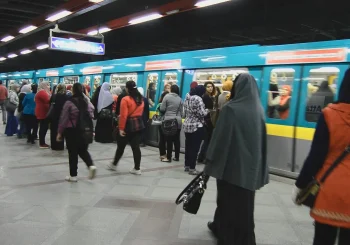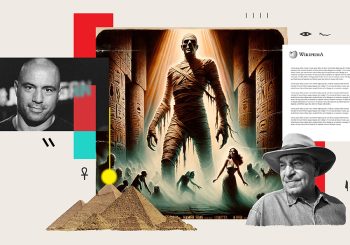Reacting to Director of Research at the Institute for Social Policy and Understanding (ISPU) in Washington D.C. Dalia Mogahed’s article “This is the Face of a Terrorist” for New York Daily News, this article discusses the role of US media covering terrorism-related attacks and how it shapes stereotypes about Muslims around the world.
Why is it that when a terrorist blows himself up, in the name of Islam, people in Egypt don’t describe him as a “Muslim” terrorist? Yet, the very same act and person are highlighted as Islamic and Muslim when it happens in the USA?
I’m in disagreement with the many people alleging hypocrisy in the news coverage of the latest American suicide bomber. The criticism goes something like this: if an apparent killer isn’t a Muslim, and his act wasn’t in the name of Islam, then the media won’t refer to the attack as terrorism; the media won’t refer to his faith, his skin color nor his ethnic origin. Critics are upset that the media does not refer to a suspect as white, third generation English and German who grew up Episcopalian or Presbyterian. The media doesn’t name the act of killing as terrorism or the suspect as a terrorist.
It is actually a simple game of numbers, and percentages. People form their knowledge, ideas and indeed prejudices about the “other” through media coverage. We argue that a small percentage of acts of terrorism, committed in the USA, is actually carried out by “Muslims”. But in reality, there is a sharp increase in such acts of violence attributed to Muslims who only represent a small percentage of the population. We lose this game. Political correctness can’t bridge the gaps in statistics.
There is a problem and there is no denying that there is a global surge in acts of terrorism carried out in the name of Islam. In Egypt, Saudi Arabia, Turkey or other Muslim majority countries, the labeling is more nuanced. The apparent terrorists could be labeled as Jihadists, Islamists, extremists or other qualifiers for the type of deviant Islam they fight for. But in the West, the narrative is different; it is just plain Muslim terrorist carrying out a terrorist act in the name of Allah.
This, of course, isn’t good as tens of millions who have never met a Muslim or know nothing about Islam form an impression of violence and anger in relevance to Islam. Politicians like Donald Trump stoke the fears; I still remember the ugly 2016 campaign direct mailers of Trump and other GOP candidates.
Calling the media on the use of “Muslim-terrorist” won’t make the issue go away. Combating this, as Muslim Americans, or other Muslim minorities in the West, requires some obvious yet not so simple steps.
As for legality, Arab and Muslim Americans must be vigilant in using anti-discrimination laws to fight vigorously all forms of discrimination stemming from stereotypes. I don’t care if 99 percent of Muslim Americans are bad people, the law and the constitution shall protect the remaining 1 percent. Let’s make it really expensive for those who discriminate against Muslims in employment, housing, education or travel. Let’s create a legal defense fund, let’s create a Muslim Anti Defamation League!
Muslim Americans must embrace the language of diversity when they are talking about themselves. I’m fed up with fundamentalist Muslim Americans trying to define all Muslims to be the same as they are. Who was behind the shut down of the lively website Muslim Wakeup? Who labeled as enemies the Progressive Muslim Union and the gay Muslim organization Al Fatiha? It was mostly other Muslims in the USA and elsewhere ganging up on these activities fearing it will influence their own families and threaten their faith.
Like it or not, in the West, Islam, like Judaism, is both a religious and secular identity. Most Muslim organizations in the USA count secular Muslims when they are seeking to show Muslims as an impressive number, yet they fight tooth and nail to exclude these very same people from whatever platform is afforded to Muslims. Again organizations like ISNA, MSA and CAIR fight the appearance diversity of Muslim and insist on the one narrow definition of Islam. All these organizations continue to suffer from the influence and mindset if not necessarily the outright control of Muslim Brotherhood. These organizations must evolve into becoming inclusive political, not religious organizations.
Muslims, in general, have become ultra sensitive to the ‘T’ word, terrorism. Often times, a hate crime is a far more serious moral and legal charge than terrorism. I’ve heard people angrily protest: “What do you mean hate crime, this isn’t just hate crime, this is terrorism.”
Well, I have news for some of my fellow Muslims: hate crime may have zero purposes other than the expression of hate. Hate crimes often have no political goals whatsoever and all the goals of hate crimes are immoral. The goals of terrorism can be mired in hate, but with terrorism, it’s the means that are abhorrent regardless of the goals. Hate crime has no moral standing whatsoever on means or goals whereas terrorism, at least conceptually, may have moral goals. Blowing up abortion clinics is abhorrent terrorism, it’s using terror for a goal that some may view as moral. From the left, incidents of terrorism on behalf of environmental or animal rights goals happen; here, we see liberal progressive goals being expressed through terrorist acts. There are worse charges than terrorism, hate crimes are and should rightly be so.
I’m not saying that I’m thrilled with the language of the media and its role in adding to the stereotypes. I start with our role as Muslims first in creating the stereotypes. The media mostly regurgitates whatever sentiment is already out there. I won’t be holding my breath for a Breaking News banner that will explain that a terrorist who is mistakenly interpreting the peaceful teachings of Islam, has blown up himself killing scores of innocent people, in the name of Islam, wrongly.







Comments (0)